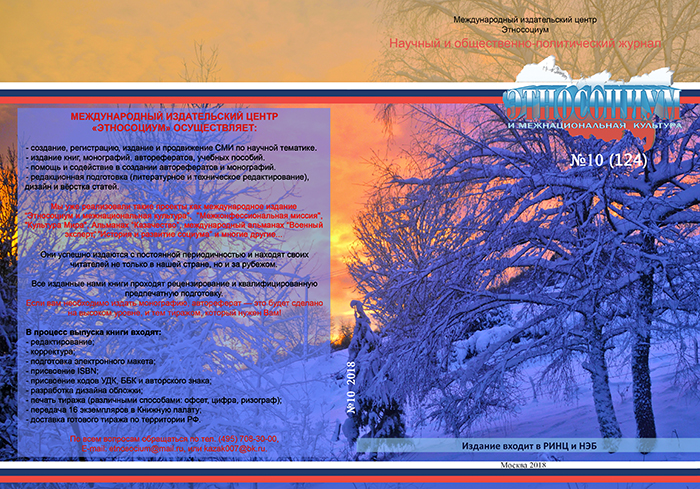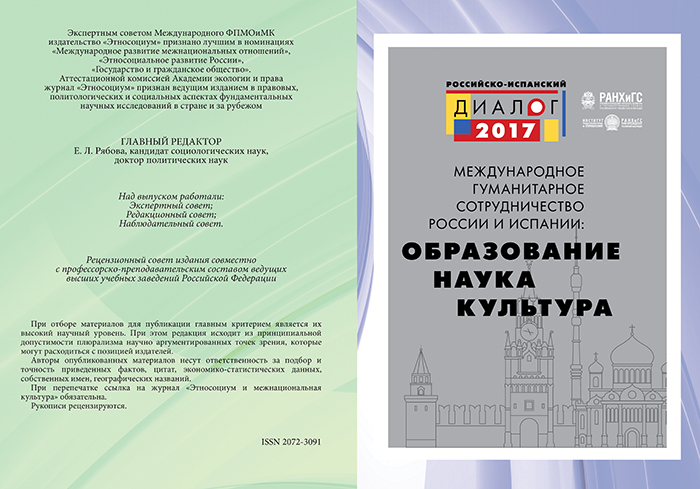

Content
|
COUNCIL OF INTERNATIONAL RELATIONSHIP
|
|
|
Shinkarenko V.D. Russia in search of new development paradigm
|
9
|
|
Mikhailova N.V., Iglin D.А., Grishin V.O. Political culture and communication: actual reading
|
32
|
|
Popov A.V. The impact of digitalization on the formation and management of public opinion
|
39
|
|
ACTUAL PROBLEMS OF MODERN SOCIETY:
POLITICS, ECONOMICS, LAW
|
|
|
Amelin E.V. The system of advanced training of restorer-builders
|
47
|
|
Grigorieva K.S., Endryushko A.A. Differences in the gender order of Dagestanis and Muscovites in the perception of rural residents of the Republic of Dagestan
|
53
|
|
Murashko S.F., Yermolayeva Y.S., Mostynets O.A. Specificity of management processes in organizations with public participation
|
63
|
|
REGIONAL STUDY:
POLITICS, ECONOMICS, LAW
|
|
|
Abazalieva M.M. State ecological policy: problems of implementation (on the example of the Karachay-Cherkess Republic)
|
70
|
|
Demina V.A. The classical and innovative approaches to the definition and measurement of social capital
|
77
|
|
Semedova-Polupan N.G. On the implementation of national ideas and strategic development objectives of the Russian Federation in the field of public health (on the example of the Chuvash Republic)
|
86
|
|
INTERNATIONAL RELATIONSHIPS:
POLITICS, ECONOMICS, LAW
|
|
|
Shershah Aryan Mohammad Hassan Afghanistan’s Foreign Policy From The End of the 20th Century To The Beginning of the 21st Century
|
95
|
|
NEWS
|
|
|
Zorin V.U. Italy-Rome
|
103
|
|
MDN discussed the role of civil society institutions in the harmonization of interethnic relations in the metropolitan area
|
106
|
|
MARI EL REPUBLIC
|
|
|
Dergachev S.V. Time to live in Mari El Republic
|
109
|
|
Dergachev S.V., Ponomarenko B.T. About some directions of improvement of professional development of the civil servants of the Mari El Republic in modern conditions
|
114
|
|
International cultural cooperation of the Republic of Mari El Republic
|
120
|
|
Dergachev S.V. 25 years of legal education in the Republic of Mari El
|
124
|
|
Lunichkin A.N. Cultural heritage of Mari El and its preservation
|
129
|
|
REVIEW
|
|
|
Bormotova T.M. Review of the statistical handbook "Factors of consumer choice in the entertainment market"
|
136
|
|
Abstracts
|
138
|
|
Authors
|
149
|
|
Requirements to materials submitted to the international publishing house "Etnosocium"
|
153
|
Any state cannot long exist without modernization. Economic, scientific, technological, and military competition of countries aspiring to leadership simply requires that they formed the gap from its main competitors, to adequately react to external challenges. It often happens that foreign and domestic policy do not correspond to each other, which leads not to a balanced policy in the state. The more intense the modern world develops, the more obvious it becomes that it is impossible to reach a certain level, remain at this level without making any effort to find a new, because any halt in internal and external development leads to the accumulated backlog.
Keywords: liberalism, politics, social economy, social state, social space, social technology, traditional culture and values.
The relationship between the concepts of political culture and communication is because the nature of political communication is based on the nature of political culture. Traditions, norms, stereotypes and images of thinking in a society affect the nature of communication. But at the same time, political communication has an impact on culture because the information exchanged among participants in this process can update the questions and cause discussion about a political phenomenon or action.
Keywords: politics, culture, political culture, political communication.
The article examines the problematic and debatable aspects of the impact of digitalization on the formation and management of public opinion. It is stated that digitalization means the total automation of the management of key social and economic processes. The importance of digitization in the context of the transformation of public opinion is, in particular, the ongoing change in the way the impact on the socio-economic processes, as well as large-scale influence on mankind, the way of communication between individuals, ultimately, on the mass consciousness. It is noted that digitalization is changing the way of news, information rate, audience coverage, and it transforms the institutional environment exchanges between citizens, provides for this new opportunity and platform, and a content-essential characteristics of digitalization phenomenon serves its considerable influence on the development and system transformation communications, both globally and locally. It is noted that in the digital age, the habitual communication styles are changing, including knowledge transfer and the development of the media formed a universal audience that consumes the same information. It is stated that, although the arguments in favor of fairly significant impact of digitization on a radical transformation of the specificity of the public opinion are rather scarce, at the same time, the digital age triggers the simplification of the exchange of opinion and relaying processes, increasing opportunities in this area, and, respectively, in the field of study and management of public opinion. Digitalization affects the appearance and development of new instruments in this field, new ways of shaping public opinion, its exchange and relay reports to the subjects of public policy, and, of course, the study of public opinion. The article concludes that digitization offers unique opportunities to expand and complicate the content analysis allowing implementing a risk-based approach to the monitoring of public opinion, the result of which can be a timely identification of destructive moods in society, potentially carrying the threat to public welfare and civil peace.
Keywords: Digitalization, public opinion, digital era, mass communications, mass media, public consciousness, propaganda.
The article explores the features of the development of the system of training and advanced training of restorers-builders. The features of the construction of the learning process and the factors for increasing its effectiveness are analyzed.
Keywords: restoration, training system, professional development, professional retraining, innovative methods.
On the research materials in republic of Dagestan we analyze the differences in the gender order of the Dagestan and Moscow communities in the perceptions of rural residents of the republic (with and without migration experience). The conclusion is made, on the one hand, on the influence of traditional Islamic culture on the gender order in Dagestan, on the other hand, on the current economic situation, which forces man and women to go to work, which, affects the gender structure of the giving communities.
Keywords: gender order, internal migration, republic of Dagestan, Moscow, labor migrants.
The article discusses specific problems of managing an organization with public participation, due to the special status of the state in the management system at the level of strategy and resource management. Special attention is paid to the problems of institutional ambivalence, diffusion of communication and personnel policy of an organization with public participation.
Keywords: organizational culture, crisis management, personnel management.
In accordance with the Constitution of the Russian Federation everyone has the right to a favorable environment, everyone is obliged to preserve nature and the environment, take care of the natural resources that are the basis for the sustainable development of life and activities of the peoples living in Russia. The state environmental policy is one of the most important factors in managing the socio-ecological situation in the country and subject of the Russian Federation. The basis of the environmental policy of the Government, ministries and departments of the Karachay-Cherkess Republic are targeted and integrated environmental programs. Regional specifics influence the formation of environmental decision-making mechanisms: political traditions, the degree of development of social movements, priorities for economic development, etc.
Keywords: state environmental policy, environmental protection, regional environmental policy, Karachay-Cherkess Republic.
The article analyzes the tasks facing the national project in the field of public health designated by the President of the Russian Federation in the new May decree. The author gives the list of the federal projects and shows the main indicators of their implementation at the regional level. The article presents the most important results in implementing the main directions of the state policy in the public health sphere and their prospects.
Keywords: public health, national projects, medical services, availability and quality of medical care, life expectancy, death rate.
The problems of the appearance and of the development dynamics in the classics’ and modern authors’ understanding of the concept definition of social capital and its structure are considered. The article presents various approaches of foreign researchers to studying social capital. The specials attention is paid to analyzing such works as «The forms of capital» by P. Bourdieu, «A Rational Choice Perspective on Economic Sociology» by J. Coleman, «The prosperous community: social capital and public life» by R. Putnam, «Trust: The Social Virtues and the Creation of Prosperity» by F. Fukuyama, «Social Capital: One or Many? Definition and Measurement» by M. Paldam and other works by prominent scientists. The article presents various methods and tools of measuring the social capital, formed by social networks, through such components as sociocultural identification, self-organization, social trust, social concentration, social solidarity, social norms, social initiative, social activity, social participation and social responsibility through the example of using these tools in the author’s sociological research.
Keywords: definition of social capital, structural elements of social capital, measuring social capital.
The article examines the evolution of the foreign policy of the Islamic Republic of Afghanistan from the end of the twentieth century to the beginning of the twenty-first century. The author researches the various periods of the statehood of Afghanistan formation from the moment of the independence of the Islamic Republic of Afghanistan in foreign policy issues from Britain to the present time. The author also studies domestic problems that played a special role in the political life of Afghanistan and led to a coup in 1973. The author pays special attention to studying the foreign policy orientation of Afghanistan during different periods of government. The descriptive method and the principle of historicism allowed the author to trace the history of the Afghanistan’s development and the evolution of its foreign policy. The article clearly shows the evolution of Afghanistan foreign policy from its weak statehood, a completely unexpressed foreign policy concept to a structured and understandable foreign policy line, and state actions in the international arena in the modern period. Today, Afghanistan is increasingly focused on the United States and the countries of Europe as the main donors to their own national economy.
Keywords: Afghanistan, foreign policy, Taliban, Najibullah, IRA, independence, coup d'etat, Amin, international relationships, Afghanistan's history.
In article some are analyzed organizationally - administrative consequences of entering of the last changes into the legislation of Russia concerning the public civil service in the part concerning professional development of civil servants of the territorial subject of the Russian Federation – Mari El Republic. Original approaches to determination of essence of this social and legal phenomenon which is directly connected with national culture and the subsidiary mechanism of its realization in regional public authorities at the present stage of improvement of domestic public civil service are presented.
Keywords: public administration, public civil service of the Mari El Republic, civil servants of the Mari El Republic, professional development of the civil servants, subsidiarity, basic higher education institution, mechanisms of professional development of civil servants.